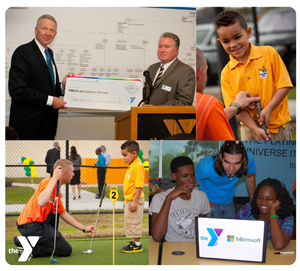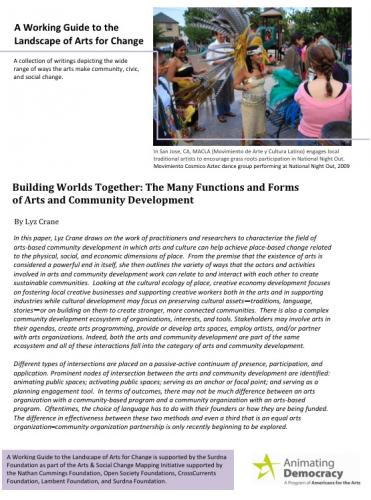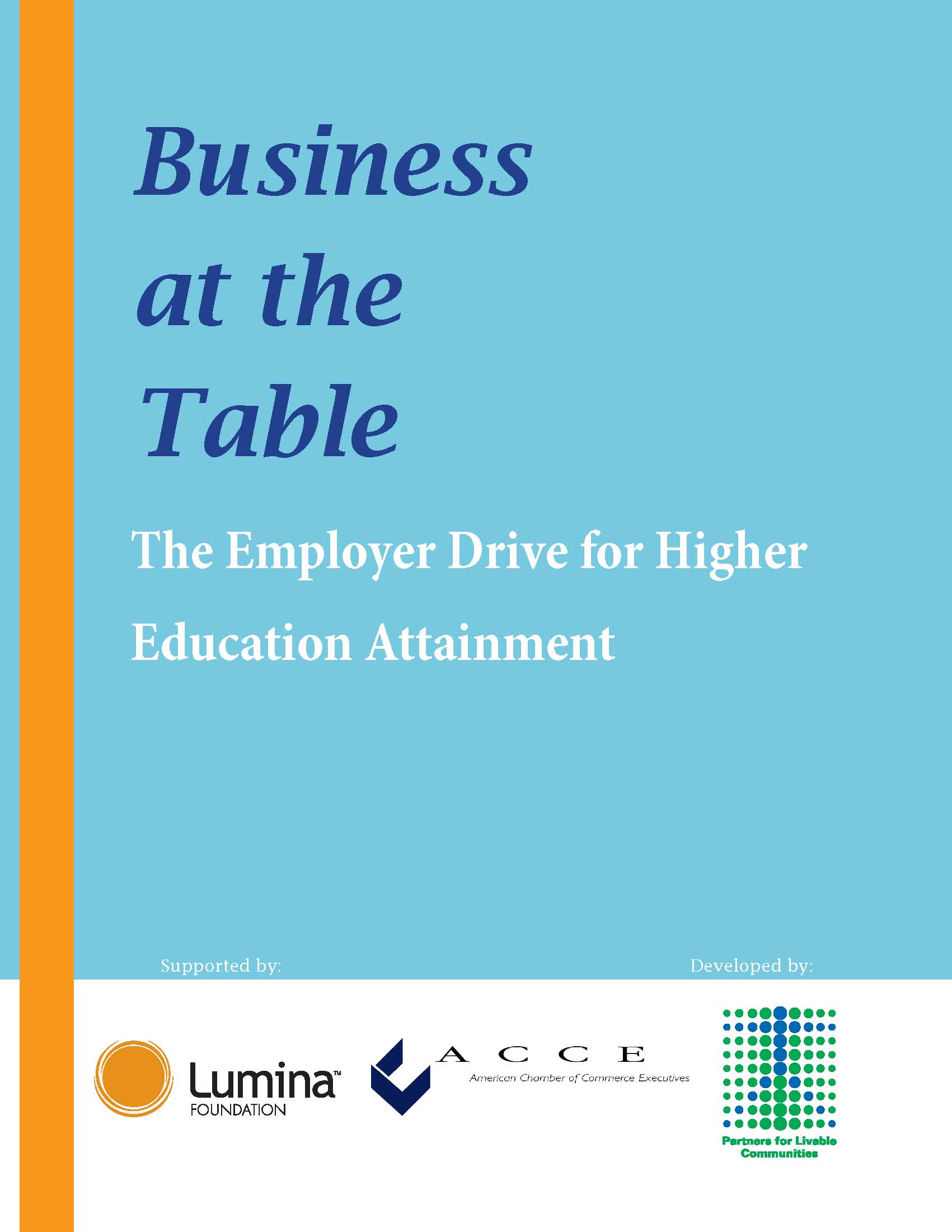Bridge Builders Award
YMCA of Central Florida & Lockheed Martin

The YMCA's Lockheed Martin Technology Centers The Lockheed Martin Technology Centers located within the South Orlando and Tangelo Park YMCAs represent the best of what happens when partners join together for the good of the community. In addition to providing fun, high-tech learning experiences for at-risk youth, volunteers from the YMCA, Lockheed Martin and Microsoft inspire students to become the future engineers and scientists of tomorrow. Like every YMCA Youth Development initiative, this program provides the after-school safety, values and mentoring kids need to thrive.
YMCA Links2Learning With a shared commitment to youth development and social responsibility, the Y and Lockheed Martin also team up to support the YMCA Links2Learning program. Through this partnership, the YMCA's Lockheed Martin Technology Centers at South Orlando and Tangelo Park enrich the minds and lives of Central Florida students, inspiring and encouraging them to pursue careers in science, technology, engineering and math (STEM). These enriching programs impact over 20,000 students every year. One example of the programs' successes was introducing inner-city youth to a new sport ─ golf. The young program participants learn about the STEM skills behind the sport while the project also instills in the youngsters the qualities of civility, sportsmanship and values.
Jonathan Gamble, a computer science major at the University of Central Florida and Lockheed Martin intern, credits his educational success to the value of the Technology Center. "Through the Lockheed Martin/YMCA Technology Center, I didn't only grow to want to be in the engineering community, I became a part of it," Jonathan said. "The technology center gave me a place to learn more about engineering in a nice, safe setting with people with interest just like me, and my internship with Lockheed Martin successfully kick-started my career as an engineer."
Jonathan started attending the Technology Center's after-school program at the beginning of his high school career. With education and the help of mentors at the YMCA, he secured an internship at Lockheed Martin the summer before he began his computer science studies at the University of Central Florida.
"Jonathan was one of three Lockheed Martin interns hired from the Central Florida Technology Centers last year," said Quality & Mission Success Vice President John Varley. "All three will return this year with additional interns as we continue to grow this STEM-focused program."
The technology center continues to build lasting relationships with students to inspire them to pursue a technical degree in college, helping support our local community, workforce and country. From science experiments that teach students how to build paper airplanes and digital bridges to college preparation courses and tours at local corporations like Lockheed Martin, the technology centers enhance the curricula local students learn in their classrooms.
"The YMCA Technology Centers are helping develop the next generation of scientists and engineers to meet the needs of the United States and global security," said Varley. "By engaging these students in extracurricular STEM activities, we show them the real-world relevance of the concepts they are learning in the classroom."
The Lockheed Martin/YMCA program prepares students like Jonathan to excel in the classroom and community, developing well-rounded leaders for the future.
Read more »
Entrepreneurial American Community Award
The Entrepreneurial American Community Award acknowledges the individuals, groups, and communities that have recognized the value of building a broad constituency among the public and private realms to improve the standing of all residents in their community.
City of Houston, Texas is being honored for successfully transforming itself from a city once reliant on the fossil fuel industry into one of the most economically and culturally dynamic American cities. With a strong economy and high level of diversity, Houston today has set an example for what American communities should aspire to become in the future.
Accepted by Gordon Quan on behalf of Mayor Annise Parker
In the 1980s, Houston was a city with an economy largely reliant on the fossil fuel industry. When oil prices started falling, the local economy suffered dramatically. The end of the oil boom slowed the city’s growth and sent Houston into a recession by the end of the decade.
Today, Houston has one of the fastest growing job markets in the country and is widely considered one of the most ethnically and economically diverse cities in the world. It is home to a flourishing arts and culture community and is quickly becoming a premier destination for foodies worldwide. Respected publications, such as Forbes and the Smithsonian Magazine, have called Houston the “Future of the Great American City.”
Smart policies and effective leadership have fueled Houston’s impressive transformation. It is clear that Houston policymakers understand what it takes to make a truly livable city. Investment in areas such as education, health, renewable energy, and technology have spurred this dramatic growth. Houston has set the precedent for America’s future cities, making it one of the most entrepreneurial communities in America today. Gordon Quan, former Mayor Pro-Tem, will accept the award on behalf of Mayor Anise Parker and the City of Houston.
Photo Description: The Port of Houston is a 25-mile-long complex of diversified public and private facilities located just a few hours’ sailing time from the Gulf of Mexico. The port is ranked first in the United States in foreign waterborne commerce and second in total tonnage.
Photo credit: Greater Houston Convention and Visitors Bureau
Read more »
Cincinnati Magazine published an article on October 30th outlining the recent history of Wilmington, Ohio. Wilmington, like so many small towns across the country, suffered immensely during the recession. In 2008 the town’s largest employer, DHL Shipping, announced that it planned to end its partnership with Airborne Express, who operated the Wilmington Air Park, and find another U.S. partner. The loss of nearly 10,000 jobs meant the city’s unemployment rate skyrocketed from 3 percent in 2007 to 19 percent by 2010. Wilmington quickly became the face of the recession, and large scale impact the economic downturn had received media attention from many major news outlets, including the New York Times and 60 minutes.
Read more »
Lyz Crane draws on the work of practitioners and researchers to characterize the field of arts-based community development in which arts and culture can help achieve place based change related to the physical, social, and economic dimensions of place. This paper examines the premise that the existence of arts is considered a powerful end in itself, Crane then outlines the variety of ways that the actors and activities involved in arts and community development work can relate to and interact with each other to create sustainable communities. Looking at the cultural ecology of place, creative economy development focuses on fostering local creative businesses and supporting creative workers both in the arts and in supporting industries while cultural development may focus on preserving cultural assets—traditions, language, stories—or on building on them to create stronger, more connected communities. There is also a complex community development ecosystem of organizations, interests, and tools. Stakeholders may involve arts in their agendas, create arts programming, provide or develop arts spaces, employ artists, and/or partner with arts organizations. Indeed, both the arts and community development are part of the same ecosystem and all of these  interactions fall into the category of arts and community development. interactions fall into the category of arts and community development.
Crane places different types of intersections on a passive-active continuum of presence, participation, and application. Prominent nodes of intersection between the arts and community development are identified: animating public spaces; activating public spaces; serving as an anchor or focal point; and serving as a planning engagement tool. Crane points out that, in terms of outcomes, there may not be much difference between an arts organization with a community-based program and a community organization with an arts-based program. Oftentimes, the choice of language has to do with their founders or how they are being funded. The difference in effectiveness between these two methods and even a third that is an equal arts organization–community organization partnership is only recently beginning to be explored.
Click here to download the whole document.
Read more »
Terms:2012, Arts & Culture, Business, CBC Report/Publication, Community Building, Community Development, Community Engagement, Creative Economy, Cultural Institutions, Featured, Other Reports/Publications, Placemaking, Public Art, Public-Private Partnerships
 Partners for Livable Communities (Partners), in partnership with the American Chamber of Commerce Executives (ACCE) and with funding from Lumina Foundation, releases Business at the Table: The Employer Drive for Higher Education Attainment. This collection of case studies was created during the Business at the Table initiative to develop strategies for improving U.S. higher education attainment (degrees and credentials) through chamber of commerce and business involvement. Partners for Livable Communities (Partners), in partnership with the American Chamber of Commerce Executives (ACCE) and with funding from Lumina Foundation, releases Business at the Table: The Employer Drive for Higher Education Attainment. This collection of case studies was created during the Business at the Table initiative to develop strategies for improving U.S. higher education attainment (degrees and credentials) through chamber of commerce and business involvement.
This compendium of case studies provides business and chamber leaders the perspective to further Lumina’s Goal 2025: to increase the proportion of Americans with high-quality degrees and credentials to 60 percent by the year 2025. Included are programs led by chambers of commerce, two-year and four-year colleges and universities, and national and local higher education achievement programs. Interviews were conducted with the CEO or director of each program, providing personal accounts of trials and victories on the road to success. Case studies explore the history of the program or organization, key players, geographic context, specific place-based economic challenges that were overcome, and the short and long-term goals that have been achieved.
Read more »
Entrepreneurial American Leadership Award
Robert Pohlman is honored for his foundational advocacy as the Executive Director of the Coalition for Nonprofit Housing and Economic Development. His influential support of the Housing Production Trust Fund and leadership has provided critical construction, rehabilitation, and acquisition of affordable housing units in Washington, D.C. during the past 10 years.
Read more »
There is a new buzz word in the battle against urban decline and vacant retail space—“pop-ups.” Simply put, a pop-up is a short term use of a retail space. Sometimes they come in the form of holiday stores, which close down after the season, while Target and other large retailers use them to promote specific products or lines. Urban development initiatives, however, have begun to use pop-ups as a tool to reinvigorate declining shopping districts and main streets by changing perceptions of the neighborhoods they open in and demonstrating to potential investors and entrepreneurs the value of investing in these communities.
Read more »
Partners’ board member Sam Williams, President of the Metro Atlanta Chamber, carried the banner for business leadership in helping to solve urban problems during remarks last month to the TEDxAtlanta conference. Calling for business leaders to fulfill roles as “urban statesmen,” Williams articulated a vision shared by Partners in which business leaders and elected officials can work together as members of a team to find creative and innovative solutions to urban problems. Service on Partners’ board is just one way in which Mr. Williams works daily to translate this vision into reality.
Read more »
Discussions of livability typically focus exclusively on urban living, yet 20% of the country lives in rural areas or small towns. As speaker Rachel Goslins pointed out at Partners’ "Building Livable Communities” forum, “It’s not necessarily true that a livable community is a city.” Goslins, the executive director of the President's Committee on the Arts and the Humanities, asked us all to consider what livability means for small towns and what urbanites can learn from them. Her observation is a fitting one. Small towns fare well in many aspects of livability, boasting low crime rates, access to natural amenities, affordable housing and land, ease of mobility (for most), and engaged citizens with a strong sense of community. Yet there are many barriers to livability in small towns, as they strive to deal with changing demographics, the decline of traditional industries, environmental damage, and deteriorating infrastructure. These woes may sound familiar to residents of any size city, but the effect and the solutions for small towns are often different. Long distances between amenities, limited resources, and negative stereotypes about rural America can make these challenges more difficult to surmount.
Nonprofit urban café creates opportunities for local residents in arts and culture and most importantly, in employment.
Read more »
Terms:Arts & Culture, Business, Community Building, Community Engagement, Diversity, Education, Health & Wellness, Jobs, Neighborhood Revitalization, Social Capital, St. Louis, MO, Workforce Development, Youth
Minneapolis, MN
A central gathering place, market, and community center for members of the Minneapolis Latino community.
Read more »
El Paso, TX
An unusual bank that helps to fill the funding gap while promoting the economic self-reliance of individuals and families.
Read more »
Terms:Business, Community Development, Economic Development, Education, El Paso, TX, Families, Financing, Life-Long Learning, Philanthropy/Community Foundation, Urban, Workforce Development
Holyoke, MA
A grass-roots organization that promotes economic, social, and community development through food and agriculture projects.
Read more »
Terms:Arts & Culture, Business, CBC Best Practice, Community Building, Community Development, Community Engagement, Culture Builds Communities, Diversity, Economic Development, Education, Environment, Holyoke, MA, Immigration, Multicultural, Neighborhood Revitalization, Parks, Playgrounds & Gardens, Placemaking, Social Capital, Workforce Development, Youth
Entrepreneurial American Leadership Award
A powerful couple who have worked to transform downtown D.C. into the lively urban center it is today.
Read more »
Terms:2009, Awards, Business, Community Development, Creative Economy, Design, Downtown Development, Entrepreneurial American Leadership Award, Neighborhood Revitalization, Placemaking, Public-Private Partnerships, Tourism, Transportation, Urban, Visioning & Planning, Washington, DC
St. Paul, MN
A community-based non-profit organization that helps emerging entrepreneurs develop successful businesses in the Saint Paul and Minneapolis area.
Read more »
Bridge Builders Award
Enterprise Rent-A-Car, for building a greener America by collaborating with numerous national partners on initiatives that make the company a leader in environmentally friendly programs and fuel-efficient vehicles, including a partnership with the National Arbor Day Foundation, the U.S. Forest Service, and the Donald Danforth Plant Science Center.
Read more »
Bridge Builders Award
Enterprise Community Partners and its Green Communities partners for collaborating with more than 25 developers, investors, builders and residents to create Green Communities, the first national green building program developed for affordable housing. Enterprise has made a commitment of $555 million to build more than 8,500 homes for low-income people and to bring environmentally sustainable development to the mainstream of the affordable housing industry.
Read more »
Investors in America Award
Who has been a key local asset and figure in economic development and equal opportunity lending at Bank of America
Read more »
Entrepreneurial American Community Award
For having one of the most remarkable city center transformations in the nation.
Read more »
Terms:2006, Awards, Business, Chamber of Commerce, Downtown Development, Economic Development, Entrepreneurial American Community Award, Neighborhood Revitalization, Public-Private Partnerships, St. Louis, MO, Urban
Investors in America Award
Secretary of the US Treasury, for his commitment to promoting smart economic development policies and responsible business practices
Read more »
|
|